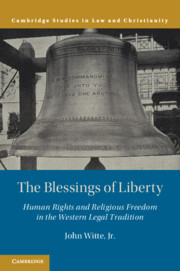Book contents
- The Blessings of Liberty
- Law and Christianity
- The Blessings of Liberty
- Copyright page
- Dedication
- Epigraph
- Contents
- Preface and Acknowledgments
- Introduction
- 1 Christian Contributions to the Development of Rights and Liberties in the Western Legal Tradition
- 2 Magna Cartas Old and New
- 3 Natural Law and Natural Rights in the Early Protestant Tradition
- 4 “A Most Mild and Equitable Establishment of Religion”
- 5 Historical Foundations and Enduring Fundamentals of American Religious Freedom
- 6 Balancing the Guarantees of No Establishment and Free Exercise of Religion in American Education
- 7 Tax Exemption of Religious Property
- 8 Faith in Strasbourg?
- 9 Meet the New Boss of Religious Freedom
- Concluding Reflections Toward a Christian Defense of Human Rights and Religious Freedom Today
- Index
7 - Tax Exemption of Religious Property
Historical Anomaly or Valid Constitutional Practice?
Published online by Cambridge University Press: 28 October 2021
- The Blessings of Liberty
- Law and Christianity
- The Blessings of Liberty
- Copyright page
- Dedication
- Epigraph
- Contents
- Preface and Acknowledgments
- Introduction
- 1 Christian Contributions to the Development of Rights and Liberties in the Western Legal Tradition
- 2 Magna Cartas Old and New
- 3 Natural Law and Natural Rights in the Early Protestant Tradition
- 4 “A Most Mild and Equitable Establishment of Religion”
- 5 Historical Foundations and Enduring Fundamentals of American Religious Freedom
- 6 Balancing the Guarantees of No Establishment and Free Exercise of Religion in American Education
- 7 Tax Exemption of Religious Property
- 8 Faith in Strasbourg?
- 9 Meet the New Boss of Religious Freedom
- Concluding Reflections Toward a Christian Defense of Human Rights and Religious Freedom Today
- Index
Summary
This chapter traces the history of religious property tax exemptions, particularly in the Anglo-American common law and equity law traditions. It analyzes the perennial controversy around religious tax exemption in the history of America, and the constitutional defense of these exemptions that emerged with arguments from history, federalism, separatism, and the social benefits that exempt properties provide at ample state savings. Religious exemptions, however, are under fresh attack today, particularly for religious groups who maintain traditional sexual morality. The chapter reconsiders the constitutionality of such exemptions in light of recent First Amendment cases, and judges these exemptions still to be constitutionally valid and socially valuable, even if subject to legislative repeal.
Keywords
- Type
- Chapter
- Information
- The Blessings of LibertyHuman Rights and Religious Freedom in the Western Legal Tradition, pp. 196 - 226Publisher: Cambridge University PressPrint publication year: 2021

